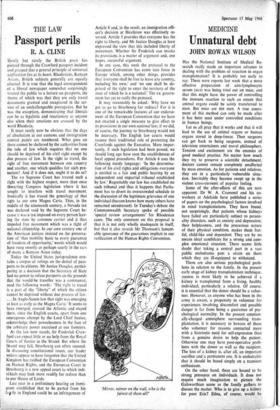Passport perils
THE LAW R. A. CLINE
Slowly but surely the British press has pierced through the Crawford passport incident and grasped that a general principle of universal application lies at its heart. Rhodesians, Kenyan Asians, British subjects generally are equally affected. It is true that the legal correspondent of a liberal newspaper somewhat surprisingly treated the public to a lecture on passports, the theme of which was that they are only travel documents granted and recaptured in the ser- vice of an unchallengeable prerogative. But he was the exception, demonstrating that liberals can be as legalistic and reactionary as anyone else when their emotions are aroused by the word Rhodesia.
It must surely now be obvious that the days of absolutism at our customs and immigration control points are numbered. What goes on there cannot be sheltered by the authorities from the rule of law which requires that no one should be deprived of his civil right except by due process of law. Is the right to travel, the right of free movement between one country and another, one which qualifies for such pro- tection? And if it does not, ought it to do so?
The us Supreme Court has treated such a right with the highest respect, more than once thwarting Congress legislation where it has sought to interfere with travel movement. Ironically it has traced the genealogy of that right to our own Magna Carta. Thus, in the middle of the nineteenth century, a Nevada tax was declared void by the Supreme Court be- cause it was a tax imposed on every person leav- ing the state by common carrier and it thus impeded free movement which was a right of national citizenship. In our own century one of the American justices insisted on the preserva- tion of 'that mobility basic to every guarantee of freedom of opportunity,' words which would have rung sweetly or perhaps sourly in the ears of many a Kenyan Asian today.
Today the United States jurisprudence con- tains a corpus of rulings on the denial of pass- ports to its citizens. Mr Justice Douglas, partici- pating in a decision that the Secretary of State had no power to refuse passports on the grounds that the would-be traveller was a communist, used the following words : 'The right to travel is a part of the "liberty" of which the citizen cannot be deprived without due process of law. ... In Anglo-Saxon law that right was emerging at least as early as the Magna Carta.' It seems to have emerged, crossed the Atlantic and stayed there, since the English courts, apart from one courageous attempt by the Lord Chief Justice, acknowledge their powerlessness in the face of the arbitrary power exercised at our frontiers. As the law now stands, Sir Frederick Craw- ford can expect little or no help from the Royal Courts of Justice in the Strand. But where the Strand may fail, Strasbourg can often succeed. In discussing constitutional issues, our leader writers appear to have forgotten that the United Kingdom has ratified the European Convention on Human Rights, and the European Court in Strasbourg is a new appeal court to which indi- vittals may look more readily for redress than to our House of Lords.
Last year in a preliminary hearing an immi- grant established that to be parted from his faFily in England could be an infringement of Article 8 and, in the result, an immigration offi- cer's decision at Heathrow was effectively re- versed. Article 5 provides that everyone has the right to liberty, and Mr Justice Douglas at least expressed the view that this included liberty of movement. Whether Sir Frederick can invoke its provisions is a matter of argument and, one hopes, successful argument.
In any case, this week the protocol to the European Convention has come into force in Europe which, among other things, provides that 'everyone shall be free to leave any country, including his own,' and `no one shall be de- prived of the right to enter the territory of the state of which he is a national.' The UK govern- ment has yet to ratify the protocol.
It may reasonably be asked: Why have we got to go to Strasbourg for redress? For it is one of the remarkable features of our endorse- ment of the European Convention that we have not enacted a single measure to give effect to its provisions in our own national law; if we did, of course, the journey to Strasbourg would not be necessary. The English law courts would resume their traditional role of protecting the Crawfords against the Executive. More impor- tantly, if such legislation had been passed, we should long ago have seen the establishment of local appeal procedures. For Article 6 uses the following sturdy language: In the determina- tion of his civil rights and obligations everyone is entitled to a fair and public hearing by an independent and impartial tribunal established by law.' Regrettably our law has established no such tribunal and thus it happens that Parlia- ment has to divert its overcrowded schedule to the discussion of the legitimate grievance of one individual (heaven knows how many others have remained unredressed). In Tuesday's debate the Commonwealth Secretary spoke of possible `special review arrangements' for Rhodesian cases. The only comment on this proposal is that it is not only wholly inadequate in itself, but that it also reveals Mr Thomson's lament- able ignorance of the guarantees implicit in our ratification of the Human Rights Convention.
'Mirror, mirror on the wall, who is the fairest of them all?'






































 Previous page
Previous page